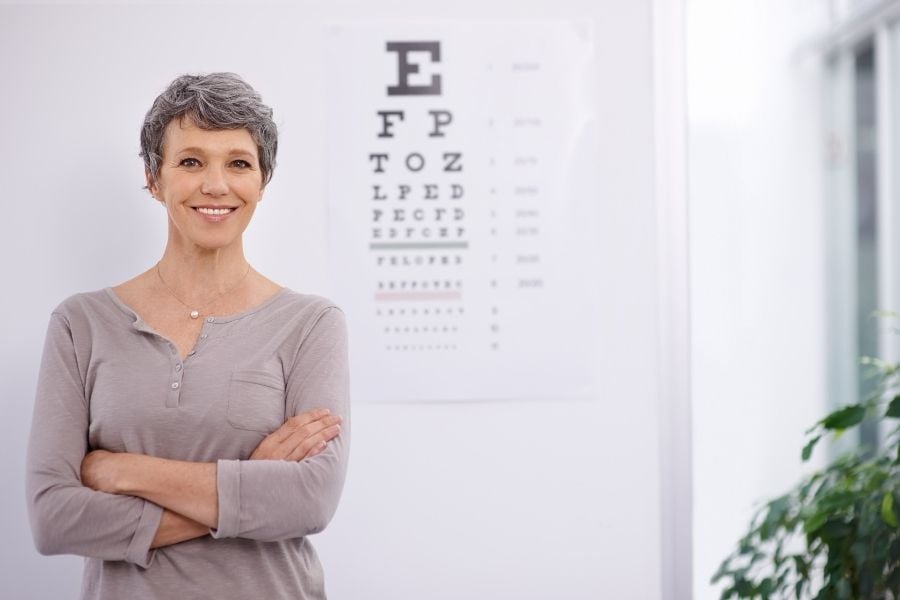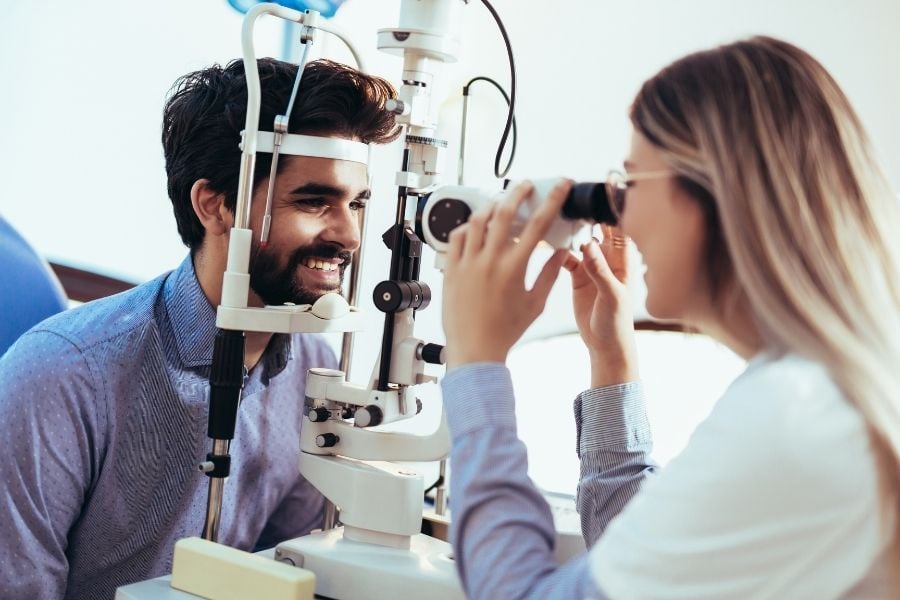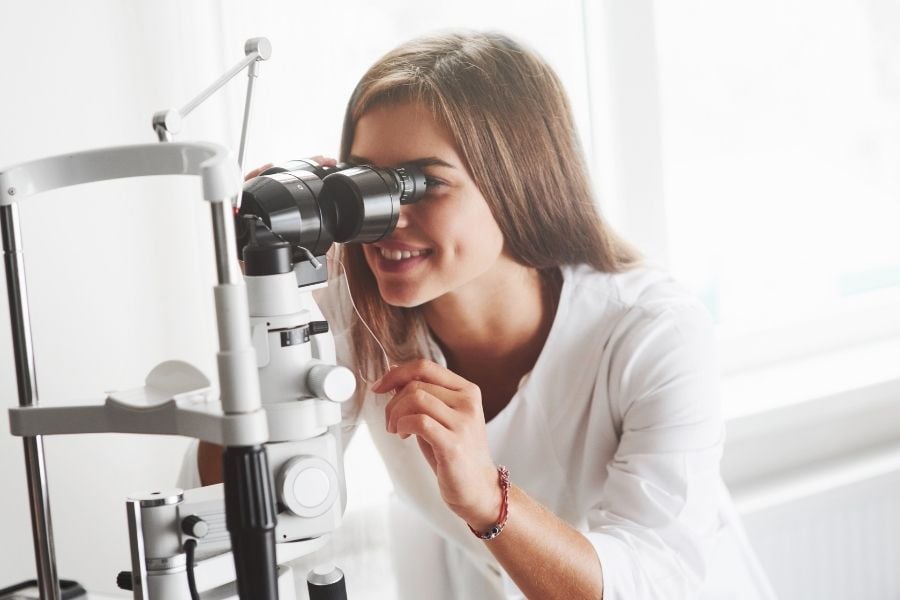If you’re lucky enough to have perfect vision, you might think visits to the Optometrist are inessential. But when it comes to ocular health, prevention is always key − especially if you want to avoid vision loss. Preventative health is something we prioritize here at HealthOne, and for Andrew Liang, our Optometrist, it’s the living and breathing reality of his day-to-day work.
“There are some diseases where whatever damage occurs, there is no reversing it,” he says. “In those situations, all I can do is stop the progression or slow it down. That’s why it’s so important to get your eyes regularly checked.”
We sat down with Andrew to learn more about the health problems eye exams can detect and why you should never miss an eye exam.
What Happens During An Eye Exam?
Eye exams are important for people of all ages. It's a simple, straightforward appointment that will be conducted by an Optometrist like Andrew.
"I get you to fill in your information, then I ask standard questions about your health history, medical history, ocular history, and if there are any issues you want to address," he explains.
Next, he'll perform a variety of steps, including a retinol scan, prescription check, binocular vision assessment (to see how well your eyes work together), and assess your overall ocular health.
"When that's all said and done, I give the patient a summary of what's going on, including any problems that might have shown up - and discuss what we can do to solve them."
Here are 5 health problems that eye exams can detect.
1. Diabetes
Our bodies are interconnected more than we could ever imagine! It may still come as a surprise, however, to learn that there’s a link between eye health and diabetes.
“This is the number one reason why general practitioners refer people to get eye exams—because we can actually determine if there are any ocular issues that could be due to diabetes,” Andrew says.
Diabetes is a disease that affects approximately 11 million Canadians. People who are diabetic are unable to produce (or properly use) a hormone called insulin, which regulates blood sugar. Having too much blood sugar can cause severe damage to your health—including your eyes.
Having too much blood sugar can damage the blood vessels in the retina. As a result, people can develop Diabetic Retinopathy (DR), which is the most common diabetic eye disease. DR acts by deteriorating your vision over time. Believe it or not, Optometrists like Andrew can detect these changes even before you notice changes in your eyesight! This fact alone helps to prove that missing an eye exam could cause more problems down the road. But is diabetes itself preventable?
“It’s preventable in a certain way,” Andrew notes. “Some people are genetically disposed to it, but that doesn’t necessarily mean that you’ll have it.” It all comes down to making healthy lifestyle choices that will lower your chances of developing the disease. Eating healthy, exercising, and staying in a healthy weight range are great places to start. You can learn more about diabetes prevention here.

2. High Cholesterol and High Blood Pressure
According to Andrew, high cholesterol and high blood pressure can also be detected during an eye exam. The most common sign he looks for is an arcus, which looks like a white ring around the perimeter of your cornea.
“When we see that, it means at some time in their life, high cholesterol is most likely happening,” he says. In some cases, a patient with an arcus will already be aware of their high cholesterol and be managing it through medication or exercise.
“But if they haven’t gotten their cholesterol checked out, we’d usually refer them to go back to their general practitioner, especially if they haven’t been to them in a while,” he adds. “Because again, if we leave this unattended, your risk of heart attack and stroke goes up.”
3. Pituitary Tumors
The third health problem that eye exams can detect is pituitary tumors. “This one is not as common, but occasionally we might come across a patient with visual field defects,” Andrew explains. “And usually when a certain pattern of this defect occurs, it can be related to some kind of growth in the pituitary gland.”
The pituitary gland plays an important role in the body by secreting hormones into the bloodstream. Since it’s located behind your nose and towards the bottom of your brain, any lesions on it have the potential to press up against your optic nerve. A routine eye exam is one of the best ways to address any vision problems you’re experiencing.

4. Uveitis
This ocular condition is characterized by inflammation of the middle layer of tissue in the eye. In many cases, it can be related to systemic diseases such as rheumatoid arthritis, ankylosing spondylitis, and sarcoidosis. Uveitis symptoms can also appear in response to other diseases affecting the eyes.
Experiencing uveitis looks different from one person to the next. But in severe cases, patients can experience the disease on a recurring basis for a long period of time. Having regular eye exams ensures that you keep in contact with your Optometrist so they can look for any changes and address any discomfort that you may be experiencing.
5. Dry Eyes
So many of us spend hours a day looking at screens, so it’s no surprise that Andrew frequently has patients experiencing headaches. “When people come in saying their head hurts or their eye hurts, oftentimes it’s due to staring at a computer too long,” he says.
One of the biggest health problems experienced by today’s working population is dry eyes. When our eyes can’t produce enough tears to stay lubricated, we can experience some not-so-pleasant symptoms. Dryness, redness, itchiness, and blurry vision are some of the most common.
When you look at screens for multiple hours a day, you blink less. This means fewer tears, less lubrication and a higher chance of developing dry eyes. Some people can also experience dry eyes because their oil glands (known as Meibomian glands) don’t work properly. If they’re dysfunctional for too long, they will die off and cannot grow back. It’s this type of damage that is not only irreversible but costly to treat.
Examples like these highlight why preventative measures are so important when it comes to our vision. Educating yourself about possible risks in the future can help you make smarter choices today. “If you work on a computer for 12-15 hours a day, you know dry eyes are eventually going to become a problem,” Andrew explains. “If you tell your doctor that during a regular eye exam, they will tell you what their recommendations are. The best course of action is to follow their suggestions.”
There are lots of simple, preventative solutions an Optometrist can recommend if you have headaches, eye pain, or dry eye symptoms. All you need to do is schedule an appointment!

How Often Should You Get An Eye Exam?
There’s so much more to eye exams than testing how many letters of the alphabet you can read. A simple visit to the Optometrist can help you stay on top of your ocular health and prevent health problems from developing later in life.
At HealthOne, we recommend kids 19 years and under get routine eye exams once a year because their eyes are still growing. As an adult, you should visit an Optometrist once every two years unless you have symptoms or concerns about your vision. Once you pass 60, coming in every year is best since the likelihood of diseases increases with age.
Eye Exam in Toronto
Getting an eye exam in Toronto is a simple, pain-free and comfortable experience − especially when you visit an Optometry clinic that priorities your experience and care. Our team is passionate about providing you with the right information and guidance to prevent health problems from developing. In the case that we detect one during an eye exam, we’ll be right there with you to help stop or slow down the progression.
An eye exam is a small investment of your time that will keep you healthier and happier the longer you live. Click here to learn more about our Optometry team.
One Life. Live Inspired.


